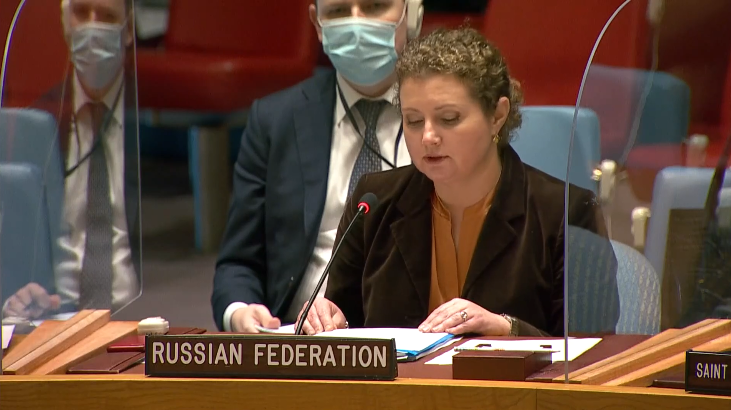Statement by Deputy Permanent Representative Anna Evstigneeva at UNSC open debate on the situation in the Great Lakes region
Mme.President,
We welcome your participation in this meeting as President of the Security Council. We thank Special Envoy of the Secretary-General for the Great Lakes Region Mr. Huang Xia, Assistant Secretary-General Ms. Martha Pobee, and Executive Secretary of the International Conference of the Great Lakes Region (ICGLR) Mr. João Caholo for their insights. We also welcome the representatives of the Democratic Republic of the Congo, Angola, Burundi, Rwanda and Uganda.
We appreciate the initiative of the Kenyan Presidency to convene an open debate to discuss the issue of the Great Lakes Region. We trust that this meeting will host an exchange of opinions, find common denominators and set out benchmarks for further efforts aimed at stabilizing the situation in this critical region.
The situation in the eastern part of the Democratic Republic of the Congo, which remains rather complicated, is a key factor defining the state of affairs in the GLR. Against stabilization in Tanganyika and Kasaï, security in Ituri and North Kivu remains an issue, because the “Allied Democratic Forces” and other armed groups do not cease their activity in these provinces. Production of natural resources still needs to be regulated, because at this point the illegal armed formations profiteer from smuggling the resources.
We are convinced that lasting normalization in the DRC cannot be ensured through military methods alone. We closely follow the efforts of the authorities aimed at reinstating control of the security situation, improving the humanitarian status, promoting socio-economic development, solving border disputes with neighboring states and inter-communal conflicts, implementing strategies for disarmament, demobilization, and re-integration of ex-combatants.
Against the backdrop of mentioned security problems and a complex humanitarian situation, including the COVID-19 factor, states of the Great Lakes Region have galvanized diplomatic efforts to build good neighborly relations. We welcome their commitment to cooperation in overcoming the emerging challenges, i.a. by collective efforts. This regards interaction in combating armed groups, reinforcing borders, as well as boosting trade. We note numerous contacts at various levels between Burundi, the Democratic Republic of the Congo, Rwanda, Uganda and the United Republic of Tanzania. We believe that chairmanship of DRC President Tshisekedi in the African Union this year will help draw extra attention to the Great Lakes Region. We highly appreciate the role of ICGLR under the Presidency of Angola. Among its recent effective initiatives was endorsement of steps on implementation of the “roadmap” on stabilization in the Central African Republic that was fundamental for President Touadera’s decision on a ceasefire.
Mme.President,
There is one common factor that unites all achievements that I mentioned. All initiatives that help stabilize the situation turn out viable only in case they have been elaborated and endorsed by the direct participants of the events and supported at the regional level. This also goes in line with the principle “African solutions – to the African problems” that we fully share. We are strongly convinced that this is an inalienable prerequisite for success. It proves the harmfulness of attempts to impose some ready-made solutions, suppress national initiatives and sovereignty, undertake an external interference. We believe the role of the global community and the Security Council is to support regional initiatives.
We welcome the efforts of the Special Envoy of the Secretary-General at this track. We proceed from the understanding that the Peace, Security and Cooperation Framework Agreement for the DRC and Great Lakes region needs to be implemented by all states. The UN Strategy for peace, conflict prevention and settlement in the GLR will give an impetus to collective efforts of the regionals. We note the start of implementation of the Action Plan promoting the Strategy. We also support “good services” of Mr. Huang Xia that promote dialogue, build confidence and normalize relations between states of the region. His comprehensive in-depth approach to the root causes of crises is highly commendable.
In conclusion, we would like to reaffirm that Russia, i.a. as a member of the Group of Friends of the Great Lakes Region will continue to actively facilitate the peace process in the DRC and stabilization in the region at large.
Thank you.
